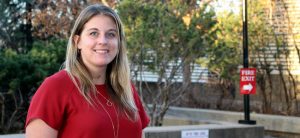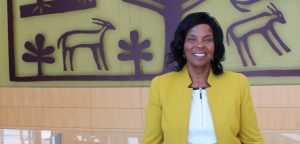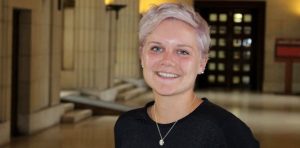International Women’s Day: the inspiring women of #intled
“At that time I didn’t think it was a big deal, I didn’t know I was making history. But I am happy I proved that women can lead”
Every week over on The PIE News, we publish a PIE Chat with someone interesting, innovative or inspiring in international education. In honour of International Women’s Day, The PIE’s staff share which of the women we’ve interviewed have inspired us the most.
***
Olive Mugenda, Kenyatta University, Kenya
“At that time I didn’t think it was a big deal, I didn’t know I was making history. But I am happy I proved that women can lead. Everybody is talking about the university, the transformation that has taken place, so I am happy that I did not let the women down.”
Natalie Marsh, reporter: Professor Olive Mugenda was the first female VC of a public university in East Africa, taking up her position in 2006. She grew Kenyatta University to the biggest university in Kenya, increasing student numbers from 16,000 to 70,000 in ten years. Interviewing her in Cape Town, I was inspired to hear how her ambitions for the university came to fruition during her tenure. She placed a great focus on inclusivity, infrastructure and innovation – integrating these principles into a ten-year strategic plan. Our readers recognise this too: “She has turned a once barrack into a world class university. She has proven that woman have voice and their place in the society,” reads one comment. It is clear that her leadership and ambitions made a significant impression on both the university and alumni alike, and led her to become an inspiring female figure in Kenyan higher education.
***
Karine Allouche Salanon, Pearson English Business Solutions, US
“It’s like going to the gym with a girlfriend, versus going on your own. If you have a peer group, you’ll be motivated to go… In creating those virtual classrooms, of peers the same level as you, we leverage this sort of social pressure, to keep thinking on how we can bring more value to the learners.”
Amy Baker, managing director and co-founder: If I think about a PIE Chat I did with a woman I was impressed by, Karine springs to mind. We talked about what it was like to be at the helm of an edtech company and her experience as a French woman who feels at home in San Francisco. We also continued after the interview discussing the art of juggling business and family life. Karine told me she always factored one afternoon a week into her schedule for “development”, which could be brainstorming for the business or allowing her to attend a sports day, but she found herself to be a better CEO and better mum by giving herself this diary space. Of course, what she had to say about the importance of “social pressure” in online learning, and how Pearson Business English Solutions understood this, was also fascinating! Karine has been in touch since to let me know she was part of a management buy-out of the company – even more impressive!
***
Sonal Minocha, Bournemouth University, UK
“We seem to put ourselves through bureaucratic systems, meetings, all resulting in an end to academic innovation. It will be two years before we can even have a conversation. I sit on committees that do that, and I go in and say – rubbish! It’s got to be changed!”

Beckie Smith, senior reporter: One of my favourite (and most memorable) PIE Chats is one I did with Sonal Minocha, pro-vice chancellor, global engagement at Bournemouth University, last year. It was after a particularly heavy day of discussions about Brexit – her contribution to which was to insist that universities must use it as a catalyst for internationalisation beyond Europe, as well as fighting against barriers to mobility within the EU. Her overflowing enthusiasm and her refreshing approach to internationalisation is infectious – there’s a stereotype that change happens slowly in higher education, but her approach to internationalisation is very much ‘Why not?’ And I love her story of coming to the UK as a young woman having barely travelled within India, let alone outside of it, and her drive to use that experience to inspire others and give them the same opportunities. You can also read Sonal’s excellent blog on her experience of being a woman in senior leadership in UK HE here.
***
Marlene Johnson, NAFSA, US
“I don’t think you build a country by appealing to people’s worst fears and worst biases. All of us need to speak to the higher good in every conversation we have. We should help people understand things beyond where they are in little conversations – the barber shop, the beauty shop, the café, the church.”
Sara Custer, editor. Of all the conversations I’ve had with international educators, my chat with Marlene Johnson, former executive director of NAFSA, is one I repeatedly think about. And it’s probably because her message of political and civic engagement is so relevant after the US election and Brexit. Marlene was also the first woman to be elected lieutenant governor in Minnesota, so she seems an especially good PIE Chat to highlight on International Women’s Day. I was able to grab her for an interview while she was in Liverpool for the EAIE conference. It was just a few months before she stepped down from her post as executive director and it was the second or third time I’d chatted with her. But it was the first time I felt like I really got to know her as a person and understand why she has so many fans in this field. The words that have stuck with me from our talk are “speak to the higher good in every conversation we have” and “small conversations in our neighbourhoods are the ones that have the possibility of changing people’s minds”. Marlene was integral in increasing NAFSA’s political advocacy and lobbying and I think in the current political climate in the West a lot of educators, on the individual and institutional level, are feeling compelled to take a stance on major policy issues. And in my opinion that’s a very good thing.
***
Nina Khairina, Council of International Students Australia
“I didn’t really have a big idea when I came into CISA, I wasn’t thinking in terms of the presidency role. I did it because I knew I had something to offer, but soon after that I realised student advocacy had turned into my passion”
Anton Crace, Australasia reporter: Nina Khairina was the first person I had a PIE Chat with, and she has been the benchmark for my chats since. While our talk itself was great, I was really taken by her confidence and drive towards achieving her and CISA’s goals. The work she has done as CISA national president to build up the organisation and ensure all international students in Australia are represented has been impressive to say the least. Her first term as president saw the organisation expand to the Northern Territory, and now in her second term, she’s spearheading programmes to stem student exploitation in the workplace as well as building legacy initiatives for CISA, to ensure the organisation has an ongoing, consistent vision. I frequently see Nina speaking on panels about the international student experience, but impressively, she is always quick to point out that her story does not represent the individual stories of every international student in Australia or around the world. She regularly challenges institutions to think about how they engage with their international student cohorts. On top of all this, she’s still very young! I really look forward to seeing what she achieves in the future.
***
Michelle Manks, WUSC, Canada
“The refugee crisis is immense and we can’t leave it up to just governments and United Nations bodies to respond to this crisis; and higher education institutions are uniquely placed to provide additional, durable solutions for refugees.”

Melissa Palleschi, business development executive: I found Michelle’s PIE Chat inspiring because I agree with her that the refugee crisis is immense and that leaving it to governments to solve the issue won’t be enough. I also find WUSC’s funding scheme, which involves a campus-wide levy, to be really unique. I certainly hadn’t heard of this before. In a much smaller capacity, I have recently started volunteer teaching for a great organisation here in London and have found it to be an incredibly eye-opening experience. It appears that also Canadian citizens and students’ eyes have been opened as well to the struggles of refugees and I hope this model WILL serve as an example of how institutions can support refugee students to find a pathway into higher education.
***
Beth Button, European Students’ Union
“I don’t think students’ voices are heard enough; there wasn’t enough of a voice of young people in the [Brexit] campaign, and that’s reflective of politics more broadly. There’s a lot of anger and frustration, but that could be channeled into something that makes a real, positive difference.”
Jane Gilham, business development director and co-founder: Beth Button’s PIE Chat in August was one that I found particularly inspiring and to be celebrated on International Women’s Day. Beth is one of the seven committee members of the European Students’ Union and when I met Beth in May I was yet again reminded of the integral value and importance of the voice of the students and young people within international education. Beth, as so many other young people, students and indeed many of us in international education, felt that her voice was not represented in the Brexit vote. I found Beth’s positive attitude inspiring and her belief that we should channel any anger and frustration into something positive. The Bergen Declaration and vision for a global student movement is yet another reminder of the power of the united global student voice.
***
Read more of our PIE Chats with inspiring women (and men) of #intled here.
All images © The PIE News.






Leave a Reply